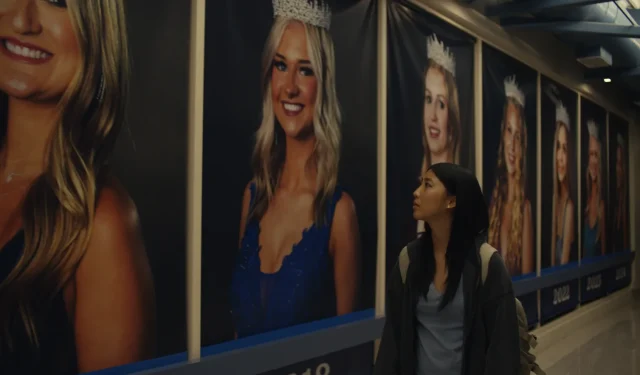The Satirical Lens of ‘Slanted’: Exploring Identity and Assimilation
George Schuyler’s thought-provoking 1931 novel, Black No More, paints a satirical picture of a society where Black individuals can undergo a surgical process to become white, reflecting on the stark realities of racial identity and the illusion of assimilation. His narrative, which critiques the myth that blending in with a dominant culture can eliminate racism and its accompanying violence, resonates profoundly in contemporary discussions about race. This overarching theme finds a new expression in Amy Wang’s directorial debut, Slanted, which recently premiered at SXSW, winning acclaim in the narrative feature competition.
A Modern Tale of Ambition and Identity
Slanted follows the story of Joan Huang, portrayed by Shirley Chen, a Chinese-American teenager consumed by the dream of becoming prom queen in a surreal representation of small-town America created by Wang and production designer Ying-Te Julie Chen. In this universe, historical representations of beauty are narrowly defined—prom queens are exclusively white, blonde, and blue-eyed. Joan’s aspirations collide with these societal norms, with her friend Brindha (Maitreyi Ramakrishnan from Never Have I Ever) encouraging her to challenge the status quo. When a potential opportunity arises for Joan to physically alter her racial identity, her ambition propels her to consider this drastic change without hesitation.
An Exploration of Immigration and Assimilation
Crafted by Wang, who directed and penned the screenplay, Slanted emerges as a biting satire that delves into the intricacies of immigration and the daunting pressures of cultural assimilation. Drawing comparisons to contemporary works such as Coralie Fargeat’s The Substance and the comedy Mean Girls, it bears the strongest resemblance to Schuyler’s original narrative. Both protagonists are driven by the belief that they must conform to a different racial identity to escape prejudice and pursue a favorable existence.
Contrasting Approaches to Satire
While Schuyler’s work delivers a stinging indictment of such beliefs, Wang’s film adopts a more nuanced, albeit sometimes predictable, tone. Although Slanted encompasses bold themes, it occasionally falls short of delivering a truly scathing critique of its subject matter. Nonetheless, Wang’s directorial confidence shines through in numerous memorable sequences, including interactions that evoke the dynamics of high school popularity.
Forging Identity Amidst Cultural Expectations
Beginning in 2015, Slanted introduces a young Joan (Kristen Cui) arriving in America, quickly confronting the harsh realities of school life and the humiliation stemming from her cultural differences. As she grapples with bullying and isolation, the concept of prom becomes her beacon of hope, a vision catalyzed by a visit to her father’s workplace at the high school. The spectacle of the prom enthralls her, revealing the allure of acceptance through conformity.
Unearthing the Dark Realities of Transformation
Fast forward seven years, and Joan’s room is a shrine to white pop culture, illustrating her internalized ideals of beauty. She resorts to various physical alterations, from using a clothespin to change her nose shape to extensive digital transformations through filters. This meticulous setup serves as a precursor to the film’s central theme of beauty horror. As Joan’s obsession intensifies, she stumbles upon a brand called Ethnos, leading her to a local clinic for a dramatic transformation that promises to put her on the social map.
Consequences of Assimilation
With her newfound identity as Jo Hunt, portrayed by McKenna Grace, Joan quickly gains popularity; however, this initial thrill soon reveals the disturbing truth of her decision. Wang’s narrative possesses moments of levity reminiscent of classic sketch comedies, yet the film struggles to sustain its energy as it delves deeper into Jo’s life. The absence of a more incisive exploration of assimilation’s costs leads to a slower middle act, leaving room for missed opportunities to heighten the stakes of her journey.
The Price of Conformity
As Jo approaches prom night, she must confront unforeseen side effects from her surgery, including physical deterioration that underscores the heavy costs of her transformation. This unsettling blend of body horror reflects her deteriorating mental state as she grapples with maintaining her illusion of beauty. While Slanted may not consistently embrace the raw urgency of its themes, it does shed light on the poignant struggles faced by those navigating the complexities of identity and acceptance.
In conclusion, Slanted serves as a contemporary allegory addressing the painful pursuit of assimilation and the yearning for societal validation, drawing a powerful line from Schuyler’s satirical roots to today’s exploration of racial and cultural identity.


